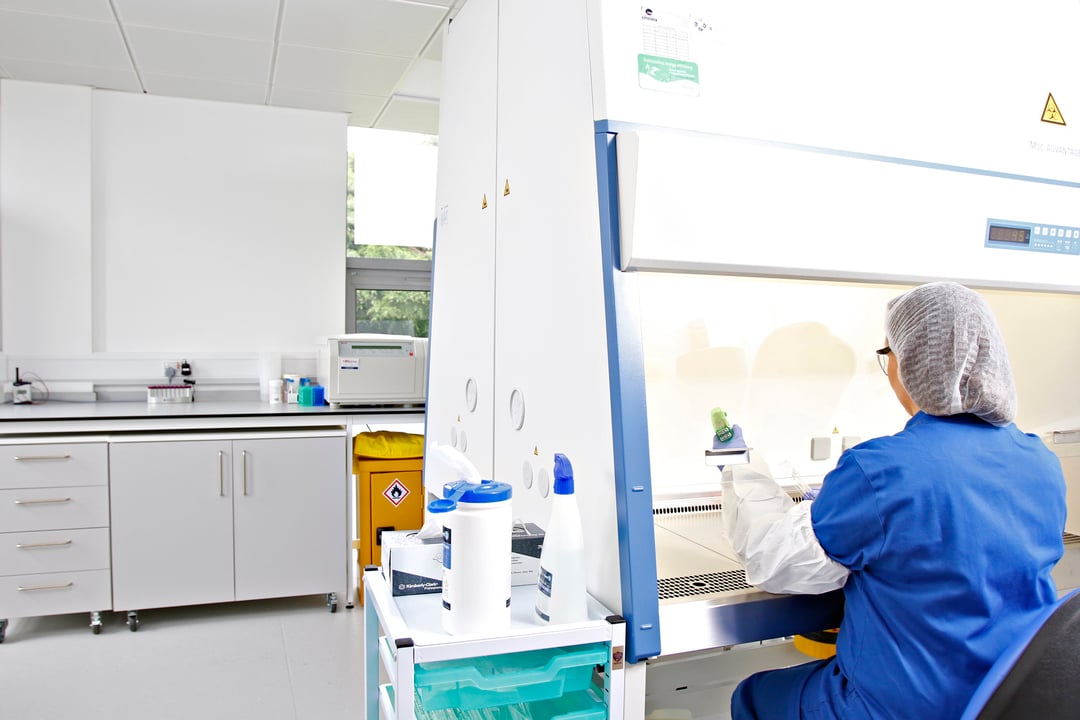What are central laboratory services?
Central laboratory services encompass a range of crucial functions tailored to support complex, multi-site clinical trials. Contract research organizations (CROs) offering central laboratory services typically manage projects, prepare kits, and provide logistical support. They conduct laboratory assays and analyses required for sample testing, compile test results, and manage electronic data and document archiving. Additionally, they play a role in the collection, receipt, management, storage, and disposal of samples, ensuring seamless and efficient trial operations.
Choosing a central laboratory services vendor
When choosing a provider to bolster your global clinical trials, numerous factors warrant consideration. In this article, we took the time to highlight the most crucial factors when it comes to selecting a vendor for central laboratory services.
1. Capability
Choosing a central laboratory provider requires careful consideration of their technical prowess and operational capacity. Assess the provider's capability by examining the sophistication of their equipment, the expertise of their scientific personnel, and the comprehensiveness of their service offerings. A robust infrastructure equipped with cutting-edge technology enables efficient handling of diverse sample types and analytical techniques, ensuring accurate and reliable results. Additionally, experience in managing projects of varying scales and complexities demonstrates the provider's ability to meet the specific requirements of your study. By prioritizing capability, you can entrust your research needs to a central laboratory equipped to deliver high-quality outcomes consistently.
2. Global or Local Reach
The decision between a global or local central laboratory hinges on the geographical scope and logistical demands of your research project. Global providers offer access to a broad network of facilities and resources across different regions, facilitating the recruitment of diverse study populations and the execution of multinational trials. This extensive reach enhances the generalizability and external validity of research findings. On the other hand, local central laboratories offer proximity and familiarity with the regional regulatory landscape, potentially expediting sample transportation and regulatory approvals. Moreover, local providers may offer greater flexibility and customization to meet the specific needs of your project, fostering closer collaboration and a deeper understanding of local nuances. Carefully evaluate your project requirements to determine whether a global or local approach aligns best with your objectives and constraints.
3. Responsiveness
Effective communication and responsiveness are essential attributes of a central laboratory provider, ensuring seamless collaboration and timely resolution of issues throughout the duration of your project. Prioritize providers known for their proactive communication channels, prompt response times, and willingness to address inquiries and concerns with diligence and transparency. A responsive central laboratory demonstrates a commitment to customer satisfaction and project success, fostering a collaborative partnership built on trust and mutual respect. By establishing clear lines of communication and expectations from the outset, you can mitigate potential delays and setbacks, maintaining momentum and progress towards your research goals.
4. Accreditation and Compliance
When evaluating central laboratory providers, accreditation and compliance with regulatory standards serve as critical indicators of quality, reliability, and adherence to ethical principles. Look for providers accredited by reputable organizations such as the College of American Pathologists (CAP), the Clinical Laboratory Improvement Amendments (CLIA), or the International Organization for Standardization (ISO). These accreditations signify adherence to rigorous quality control measures, standardized procedures, and continuous improvement practices, ensuring the accuracy, precision, and reproducibility of test results. Additionally, compliance with regulatory requirements, such as Good Clinical Laboratory Practice (GCLP) guidelines and relevant industry regulations, mitigates the risk of data discrepancies, regulatory violations, and study delays. By selecting an accredited and compliant central laboratory, you can instill confidence in the integrity and validity of your research outcomes, safeguarding the interests of participants and stakeholders alike.

5. Track Record
Assessing the track record of a central laboratory provider entails examining their past performance, reputation, and client testimonials to gauge their reliability, consistency, and suitability for your research needs. Look for evidence of successful collaborations on similar projects, including the ability to meet deadlines, adhere to budget constraints, and deliver high-quality results with minimal deviations or errors. Client references and case studies offer valuable insights into the provider's responsiveness, communication style, and problem-solving capabilities, allowing you to make an informed decision based on real-world experiences. Additionally, consider factors such as publication record, industry awards, and peer recognition, which reflect the provider's contributions to advancing scientific knowledge and innovation. By conducting due diligence and seeking feedback from peers and industry experts, you can identify a central laboratory with a proven track record of excellence and dependability, laying the foundation for a fruitful partnership.
6. Service Efficiency
Efficient service delivery is paramount in ensuring the timely completion and cost-effectiveness of your research project. Evaluate the efficiency of a central laboratory provider by assessing their operational processes, turnaround times, and quality assurance mechanisms to identify areas for optimization and improvement. Streamlined sample handling, logistics, and data management workflows minimize bottlenecks and delays, maximizing the productivity and throughput of laboratory operations. Additionally, automation, digitalization, and integration of innovative technologies enhance the speed, accuracy, and reliability of analytical procedures, reducing manual errors and increasing throughput capacity. Furthermore, proactive communication, project management, and client support facilitate seamless coordination and collaboration between stakeholders, ensuring smooth project execution from initiation to conclusion. By prioritizing service efficiency, you can minimize resource wastage, optimize project timelines, and achieve your research objectives with maximum efficiency and effectiveness.

The changing landscape of global clinical trials
Sponsors rely on specific criteria when selecting Central Laboratory Service (CLS) providers, often employing two mechanisms: quality system and facility audits and technical qualification for the required procedures outlined in the clinical trial protocol. In the typical clinical trial structure, the sponsor serves as the central figure, initiating the trial, developing and revising protocols, and overseeing its finalization and monitoring. For complex global trials, sponsors frequently enlist Contract Research Organizations (CROs) to handle some activities.
Concurrently, sponsors navigate regulatory approvals, ethics committee clearances, and select clinical sites and investigators. Bi-directional communication is key among all stakeholders in clinical trial management. In global trials, sponsors may opt for a full-service Global Central Laboratory or employ an "umbrella" CRO to coordinate with smaller CROs and laboratories. However, this setup can sometimes introduce communication complexities and bottlenecks.
As sponsors navigate through the complexities of modern trials, including decentralized approaches and the utilization of patient-centric strategies, the selection of a CLS vendor becomes even more significant. While the shift towards decentralized trials and automation brings about changes in trial management dynamics, it doesn't diminish the importance of CLS providers. In fact, their role becomes more nuanced and essential than ever before. CLS vendors still serve as the backbone of clinical trial operations, ensuring the quality and accuracy of laboratory procedures and data management, regardless of the trial's complexity or decentralization level.
As sponsors increasingly rely on Contract Research Organizations (CROs) for trial management, CLS providers may need to collaborate closely with these entities to streamline processes and mitigate communication complexities. The ability of CLS vendors to integrate seamlessly into the broader trial infrastructure becomes a key differentiator in vendor selection.
The importance of CLS providers remains steadfast. Their expertise, reliability, and adaptability ensure the success of modern trials, enabling sponsors to navigate the complexities of decentralized approaches while maintaining a patient-centric focus. As sponsors adapt to the changing landscape, the choice of CLS vendor becomes not just a necessity but a strategic decision that can significantly impact the trial's outcomes and efficiency.
Central Lab Services at REPROCELL
At REPROCELL, you can choose and combine from a range of clinical laboratory services to meet your individual study needs and timelines.
From choosing the right service package to providing you with valuable data sets, our expert team of scientists and project managers are available to help you throughout the entire process - from project initiation to study completion.





.jpg?width=1000&height=562&name=Untitled%20design%20(5).jpg)

